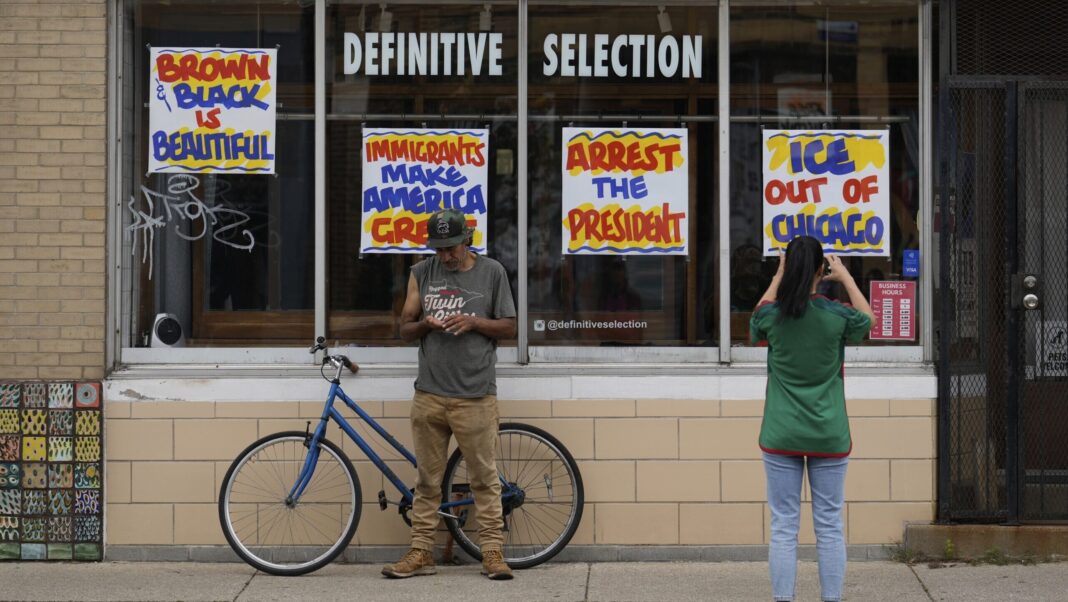### Living in Fear: Chicago’s Immigrant Communities Amidst Political Uncertainty
In the heart of Chicago, a city renowned for its vibrant culture and diverse neighborhoods, the atmosphere has shifted dramatically in recent months. Streets that once thrummed with life are now eerily quiet. Public schoolteachers are advocating for online learning options for families apprehensive about stepping outside. Houses of worship are urging community members to carry identification at all times. A palpable sense of fear is engulfing communities that historically thrived on resilience and togetherness.
#### Federal Intervention Looms Large
As Chicago braces for a much-anticipated federal intervention, residents find themselves altering daily routines under an oppressive cloud of uncertainty. President Donald Trump has pledged a surge in deportations and national guard troops targeting cities that lean Democratic. Although feelings of vulnerability, particularly among immigrant communities, are not new, many residents assert that the current wave of fear feels remarkably deeper than previous seasons of anxiety.
Sam Sanchez, a Chicago restaurateur and a naturalized U.S. citizen from Mexico, captures this sentiment perfectly. Despite having voted for Trump, he openly criticizes the Republican Administration’s plans for Chicago. “They’re profiling,” Sam shares, recounting an experience where he insisted his wife carry her citizenship papers to a wedding. This simple yet telling action is a testament to the abnormality that has become the new norm.
#### Business Impact: A Downturn in Foot Traffic
In neighborhoods like Little Village, known for its rich cultural fabric and entrepreneurial spirit, the impact of fear is starkly visible. Once bustling with street vendors and customers, the area now witnesses a noticeable decline in foot traffic. Galilea Mendez, who frequently visits, reflects, “The streets that were busy are dying down.”
Such sentiments echo throughout the community. Business owners here vividly remember past immigration raids, like the infamous 2007 lockdown of a local shopping mall and heightened enforcement in 2019. Yet, residents express that the current climate feels more intense.
Laura Padilla, a clothing vendor with over two decades of experience, notes a significant downturn: “Since Trump’s second term, the streets are ‘dead.’” Fellow merchant Xochitl Martinez shares a more general sentiment urging better support for Latinos. “He has to support Latinos so we can work, so stores can open,” she insists, casting a vision of hope amidst despair.
#### Dimming Celebrations and Canceled Events
Amidst looming threats, traditional celebrations like Mexican Independence Day have been overshadowed. Chicago typically marks this occasion with festive events, parades, and car caravans, but anxiety has prompted organizers to scale back. Some events have been canceled altogether, while others have opted for increased security, drastically altering the festive atmosphere.
Additionally, clients of immigration attorneys are hesitating to attend appointments, while churches, acting as community sanctuaries, have started to see declining attendance. Fabio Fernandez, who runs an art and T-shirt company in Pilsen, conveys a mood of tension. “We shouldn’t fear or feel like we can’t walk the same streets that we usually roam,” he adds, poignantly capturing the sentiment of many.
#### A Surge in Recent Arrests
Heightening these fears are recent immigration arrests that have sent ripples through the community. Calls to emergency hotlines meant to report immigration activities have surged; misinformation abounds, creating a climate of paranoia.
Activists from groups like Organized Communities Against Deportations express deep concern about the situation, suggesting that while deportations may have always been a reality, the current level feels unprecedented. They highlight troubling instances where masked federal agents targeted individuals in predominantly Latino areas, intensifying community fears and prompting calls to action.
#### The Urgency to Carry Identification
In response to the heightened threats, community leaders and activists have begun counseling residents—including U.S. citizens—to carry identification and keep their documentation on hand. Vianney Alarcon, a Chicagoan, notes a shift in her own behavior, stating she now carries her passport whenever she leaves home. “It’s just disheartening,” she admits, reflecting a shared emotional burden among her peers.
Chicago’s demographics reveal that about 20% of its 2.7 million residents are foreign-born, with the largest groups originating from Mexico, China, and India. In the face of fear, faith leaders across various denominations are networking to encourage people to film interactions with authorities and protest against unjust actions. Rev. Otis Moss III, affiliated with the influential Trinity United Church of Christ, said, “We will fight for this city,” exemplifying the spirit of resistance.
#### Teachers Advocate for Online Learning
In a bid to address concerns, teachers of Chicago Public Schools are also stepping forward, calling for online learning options for students fearful of immigration enforcement. Union President Stacy Davis Gates advocates drawing inspiration from Los Angeles schools that offered virtual options amid similar crackdowns during earlier administrations.
While Chicago Public Schools maintain that in-person learning is crucial for academic success, they are reportedly reassessing the situation. “In-person instruction continues to provide the strongest foundation for learning,” district officials reaffirm. Nonetheless, the reality remains that many families are feeling increasingly vulnerable as teachers disseminate flyers informing parents of their rights.
“Being informed is the best way to empower our communities to stay safe,” asserts special education teacher Linda Perales, highlighting the importance of knowledge in uncertain times.



